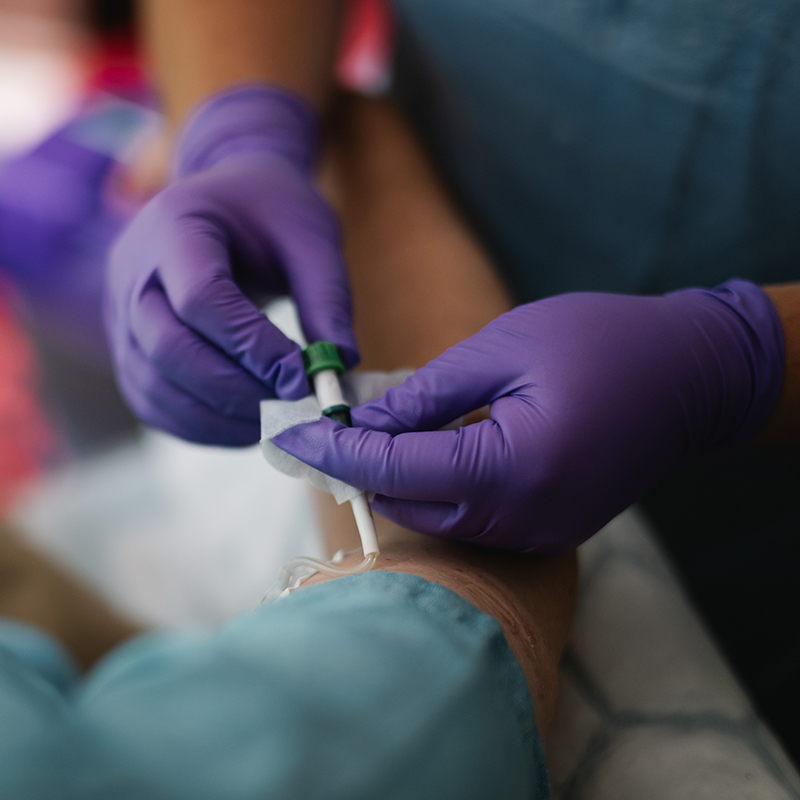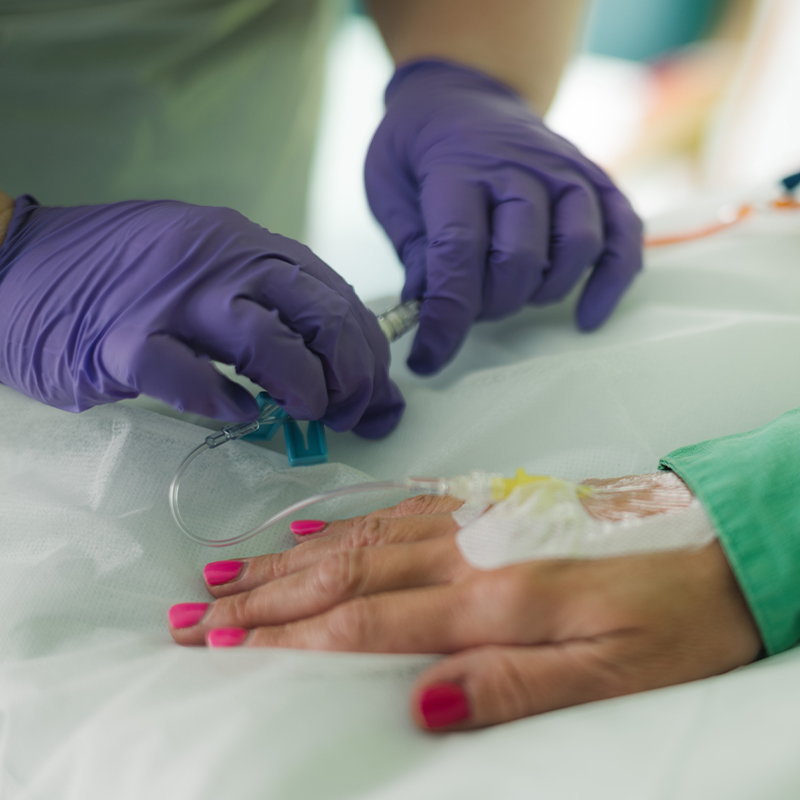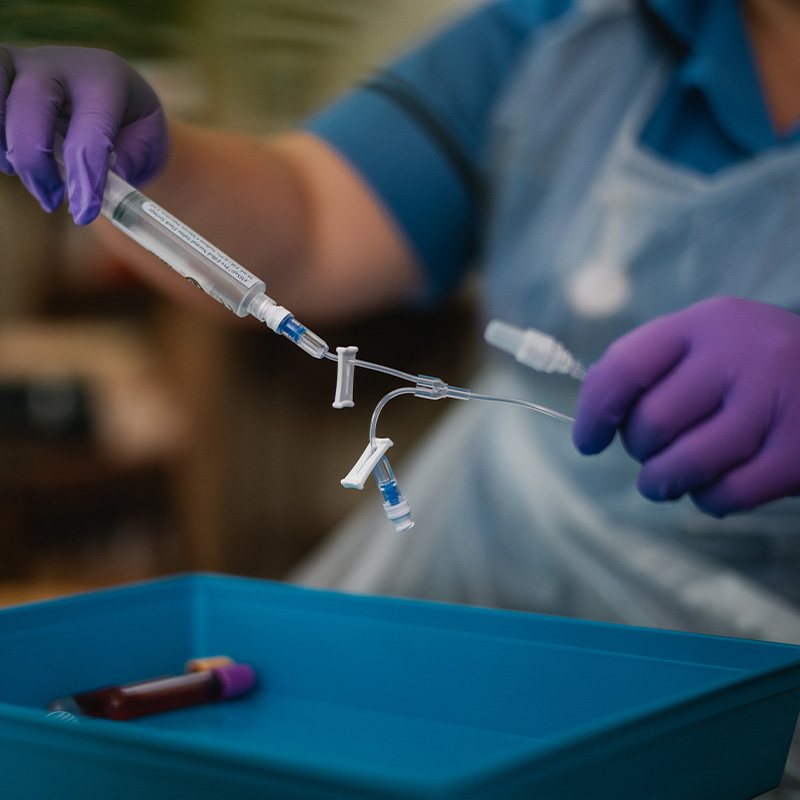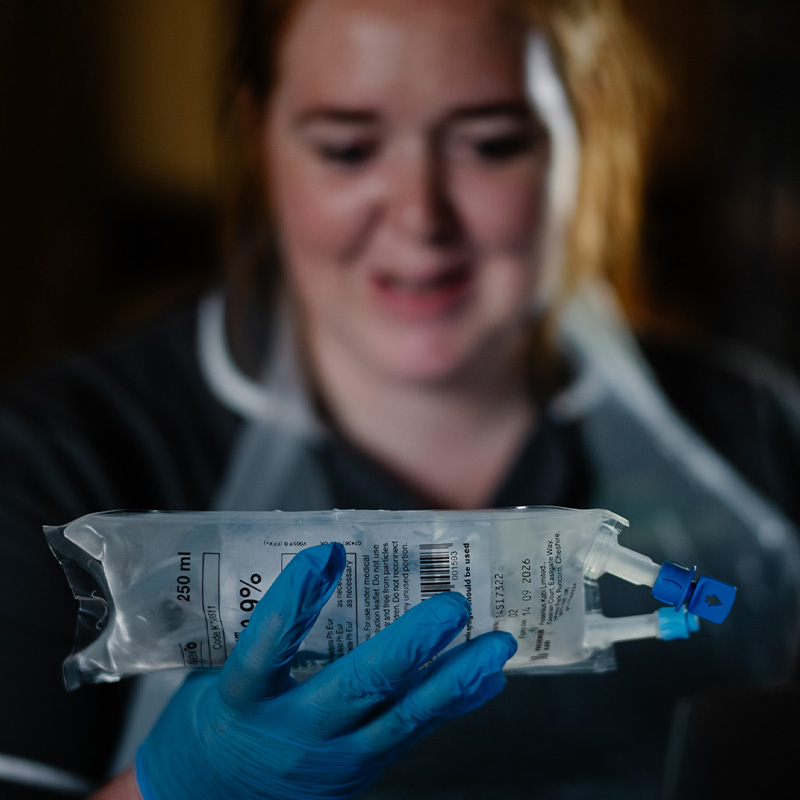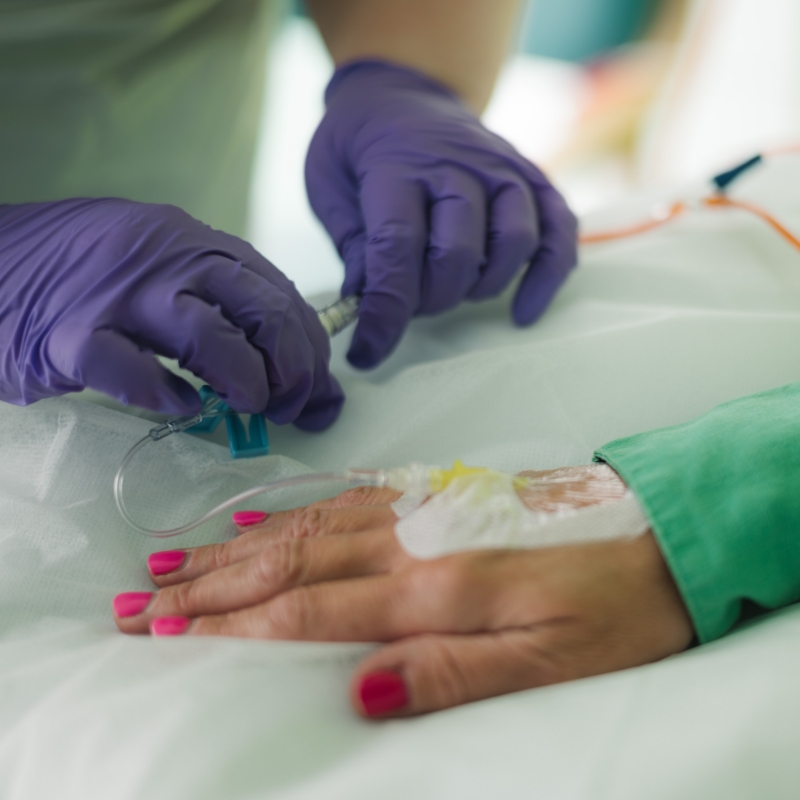Understanding private breast cancer treatment costs in the UK
Navigating a breast cancer diagnosis, and trying to understand private treatment costs, can feel overwhelming. If you’re considering private healthcare for breast cancer, our guide is here to help you understand private prostate cancer treatment costs in the UK:
- The differences between private healthcare and NHS care for breast cancer
- The key factors that impact private treatment costs
- Cost Benefits of Home Treatment
- Insurance Coverage and Payment Options
- Making Your Decision: Factors to Consider
We’re here to help patients understand their options and assist you to find solutions that are right for you.
What influences private breast cancer treatment costs
The cost of private breast cancer treatment varies. Understanding these elements helps you prepare financially, and make informed decisions, about your treatment options.
Type, and stage, of breast cancer
Different types of breast cancer require different treatment approaches. The complexity of your case influences not only the type of treatment you’ll receive, but also the duration and frequency of care. State-of-the-art diagnostic tests help identify the exact type of cancer you have, ensuring your treatment plan is tailored precisely to your needs.
Treatment approach and duration
Your treatment plan may include surgery, chemotherapy, radiotherapy or a combination of these approaches. Each treatment type has different cost structures:
Surgery costs for procedures like lumpectomy, or mastectomy, depend on the complexity and whether breast reconstruction is required.
Chemotherapy expenses depend on the number of cycles needed, the specific drugs prescribed and the delivery method.
Radiotherapy treatment depends on the number of sessions required and the technology used.
Hospital location and facilities
Treatment costs vary significantly based on location, with London clinics typically charging premium rates due to higher operational costs. However, the choice of facility also reflects the level of service, technology available, and specialist expertise.
Insurance coverage and payment options
Some insurance plans cover diagnostic tests, consultations, and treatment, whilst others may have limitations or exclusions for pre-existing conditions.
Self-funding remains an option for those without insurance coverage. Many private hospitals offer payment plans, or fixed-price packages, that help spread costs over time.
Breakdown of private breast cancer treatment costs
Understanding the specific costs involved in private cancer treatment helps you plan.
Advantage of treatment at home
One of the most significant developments in private breast cancer care is the availability of treatment at home. This approach not only reduces costs but also provides comfort and convenience for patients.
How home cancer treatment works
Home-based cancer treatment brings specialist care directly to you, eliminating the need for frequent hospital visits, whilst maintaining the highest clinical standards. Our experienced oncology nurses work closely with your consultant to deliver chemotherapy, supportive medications, and monitoring services in your familiar environment.
Cost benefits of home treatment
Treatment at home can significantly reduce your overall cancer care costs while improving quality of life:
Reduced travel expenses: Eliminate costly trips to the hospital for each treatment session.
Minimised accommodation costs: Family members don’t need to arrange expensive hotel stays, or take extended time off work to support you during treatment.
Lower hospital fees: Home treatment often costs less than hospital-based care because it eliminates facility fees whilst maintaining the same high standards of care.
Flexible scheduling: Treatment sessions can be arranged around your daily routine, reducing the need for additional childcare, or care arrangements for other family members.
Clinical Excellence at Home
Home-based cancer treatment maintains the same rigorous clinical standards as hospital care. Our specialist oncology nurses receive training at leading cancer centres and follow strict protocols for medication preparation and administration.
You’ll have 24/7 access to clinical support, ensuring any concerns can be addressed immediately. Regular monitoring and communication with your consultant ensure your treatment plan remains optimal throughout your care journey.
Insurance coverage and payment options
Understanding your payment options helps you access the treatment you need without unnecessary financial stress.
Private medical insurance coverage
Most comprehensive private medical insurance policies provide substantial coverage for breast cancer treatment, including:
- Initial consultations and diagnostic tests
- Surgical procedures, including reconstruction
- Chemotherapy and radiotherapy treatments
- Follow-up care and monitoring
However, coverage can vary significantly between insurers and policy types. Some policies may have annual limits, exclusions for pre-existing conditions, or requirements for GP referral before accessing specialist care.
Self-funding options
For those without insurance cover, self-funding remains a viable option. Many private hospitals offer:
Fixed-price packages that bundle consultation, surgery, and initial follow-up care at a predetermined cost.
Payment plans that spread costs over several months or years, making treatment more accessible without requiring large upfront payments.
Transparent pricing with detailed cost estimates provided before treatment begins, allowing you to plan effectively.
Combining NHS and private care
You can choose to combine NHS and private care, using private services for faster diagnosis or specific treatments whilst receiving other care through the NHS. This hybrid approach can be cost-effective whilst ensuring you maintain access to NHS services.
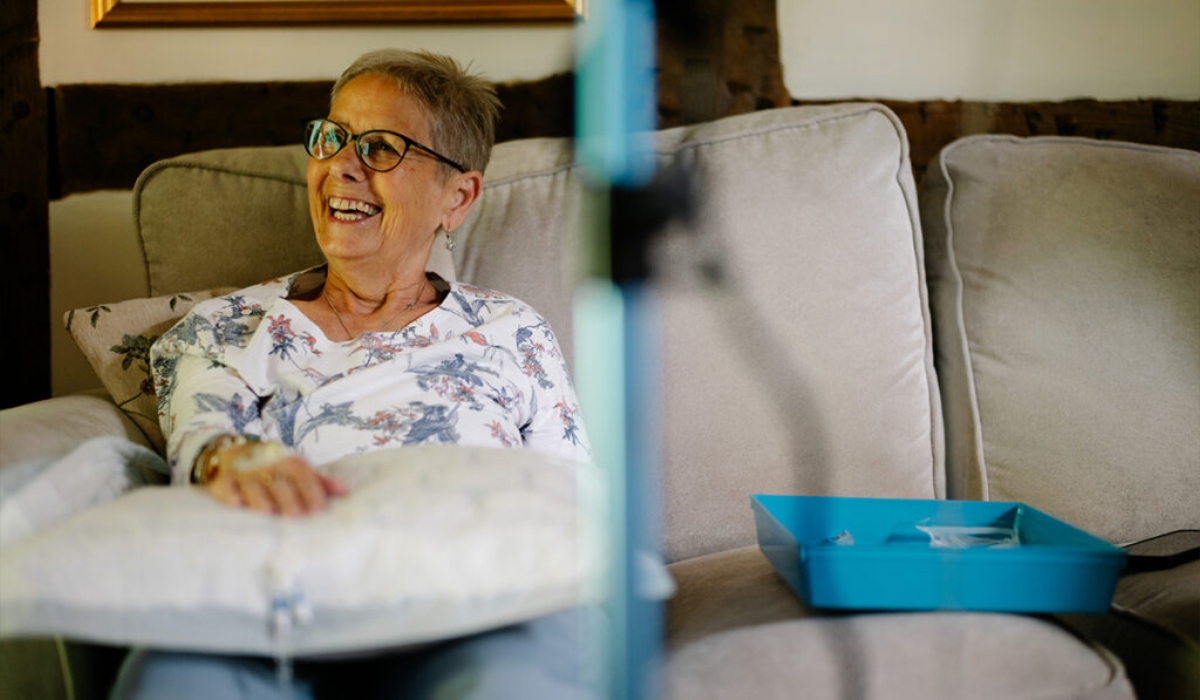
Comparing treatment settings: hospital vs home
The choice between hospital-based treatment, and home care, involves more than just cost considerations. Understanding the benefits, and limitations, helps you make the right decision.
Traditional hospital-based treatment
Private hospitals offer comprehensive cancer services with state-of-the-art facilities and specialist equipment.
Immediate access to emergency support if complications arise during treatment, with full medical teams and equipment readily available.
Comprehensive facilities, including advanced imaging, laboratory services, and surgical suites, all in one location.
Multidisciplinary teams with specialists from different fields working together to coordinate your care.
However, hospital-based treatment also presents challenges, including travel requirements, parking costs, and a clinical environment that some patients find stressful.
Home-based cancer care benefits
Comfort and familiarity of receiving treatment in your environment, surrounded by family and personal belongings that provide emotional support.
Reduced infection risk by avoiding hospital environments where you might encounter other illnesses, which is significant for patients with compromised immune systems.
Maintained routine allowing you to continue daily activities around treatment schedules, supporting both physical and emotional wellbeing.
Family involvement enables loved ones to participate more actively in your care whilst maintaining their routines.
Clinical safety and monitoring
Home-based care maintains the same rigorous safety standards:
- Specialist oncology nurses trained in cancer care
- 24/7 telephone support for any concerns
- Regular monitoring and communication with your consultant
- Emergency protocols for immediate hospital transfer if needed
What to expect: your treatment journey
Whether you choose hospital or home-based care, the process follows similar patterns with your comfort and successful outcome as the primary goals.
Initial assessment and planning
Your journey begins with a comprehensive assessment, which includes a detailed medical history, a physical examination, and diagnostic tests.
During this phase, you’ll meet your consultant oncologist, specialist nurses, and other healthcare professionals who will support you throughout your treatment.
Cost discussions happen early in this process, with detailed estimates provided for your specific treatment plan.
Treatment delivery and monitoring
Treatment begins according to your schedule. For home-based care, our clinical teams coordinate the delivery of medications and equipment whilst maintaining close communication with your consultant.
Blood tests, scans, and clinical assessments track your progress, allowing adjustments to your treatment plan as needed.
Throughout this process, you’ll have access to support services including nutritional guidance, psychological support, and practical assistance with managing side effects. This comprehensive approach addresses not just your medical needs but your overall wellbeing.
Ongoing Support and Follow-Up Care
Follow-up appointments track your recovery, monitor for any signs of recurrence, and address ongoing health needs.
This phase may include regular scans, blood tests, and consultations to ensure your continued health. Support services continue throughout your recovery, helping you adjust to life after treatment and addressing any long-term effects of therapy.
Making Your Decision: Factors to Consider
Choosing your breast cancer treatment path involves balancing multiple factors, including cost, convenience, clinical needs, and personal preferences.
Clinical Considerations
Your cancer type, stage, and individual health factors significantly influence treatment options.
Discuss with your consultant which treatments are suitable for home delivery and whether your specific case would benefit from hospital-based care.
Personal and Family Factors
Home-based care might be ideal if you have young children, elderly relatives to care for, or simply prefer familiar surroundings.
Geographic factors also matter – patients living far from major cancer centres often find home treatment more practical and less disruptive to their lives.
Financial planning
Review your insurance coverage carefully and understand exactly what’s included. Don’t hesitate to ask insurance providers for clarification about coverage limits, authorisation requirements, or excluded treatments.
Consider the long-term financial impact, including follow-up care, monitoring, and potential additional treatments. Planning helps avoid financial stress during your recovery.
Frequently Asked Questions
How quickly can I start private breast cancer treatment?
Private treatment typically begins much faster than NHS care, often within 7 to 10 days of your initial consultation. Home-based treatment can sometimes start even sooner, as it doesn’t require hospital scheduling coordination.
The speed depends on several factors, including diagnostic test results, treatment complexity, and insurance authorisation requirements. Our clinical teams work diligently to minimise delays and ensure you begin treatment as soon as medically appropriate.
Does private treatment provide better outcomes than NHS care?
Both private and NHS care use the same treatment protocols and medications, resulting in similar clinical outcomes. The main differences lie in convenience, timing, and patient experience rather than medical effectiveness.
Private care often provides more personalised attention, flexible scheduling, and reduced waiting times, which can improve your overall treatment experience and reduce anxiety.
Can I switch between private and NHS care during treatment?
Yes, you can move between private and NHS care, though this requires careful coordination between your healthcare teams to ensure continuity of treatment. Many patients use private services for faster diagnosis, then transfer to NHS care for treatment.
However, it’s essential to communicate openly with both your private and NHS care providers to ensure all necessary information is shared. This collaboration helps maintain seamless care and avoids duplication or gaps in your treatment. Remember, your health and comfort are our top priority, so please don’t hesitate to ask questions or express any concerns you may have during the transition. Both systems aim to provide the best possible care, and a coordinated approach can significantly enhance your overall experience.
We know the benefits of cancer care at home
Our specialist cancer services ensure private medically insured and self-paying patients who want an alternative to hospital can start their treatment faster. We consider all cancer treatments, including those not currently available in hospitals.
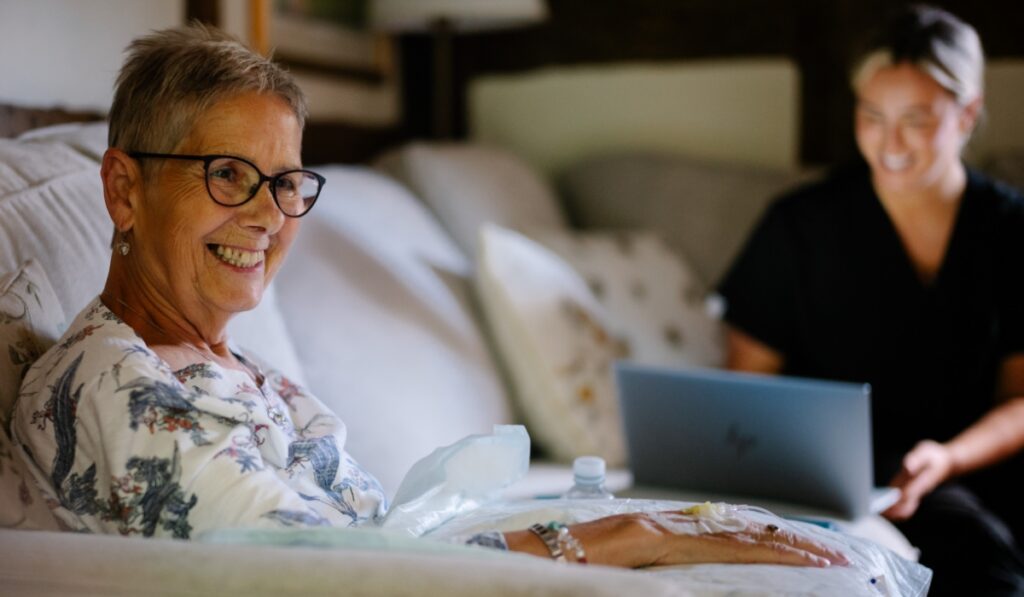
Looking for more information?
We’ve worked with thousands of patients, and we know you’ll have a lot of questions.
If you’re ready to talk to us to discuss your options, fill out the form below and we’ll be in touch quickly.
If your enquiry is urgent please call 0345 2636 123 (England and Wales) or 0345 2636 135 (Northern Ireland and Scotland).
Your guide to bowel cancer treatment
A bowel cancer diagnosis can be overwhelming. Rest assured, you’re not alone, and there are many options for managing the condition and tailoring treatment to suit your individual needs.
Our guide is here to help you understand private bowel cancer treatment and the main treatment options available.
